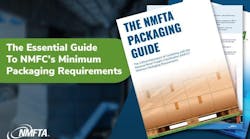As quickly as one deal came apart, a new deal between two old partners came together to keep Ford Motor Co.’s plans for an all-electric Transit Connect on track, Ford truck communications manager Anne Marie Gattari has told Fleet Owner.
“There is no change,” Gattari said. “We’re still on track [for delivery] for the second half of 2010, which was the original timeframe” for an all-electric version of the Transit Connect van.
Ford had partnered with Smith Electric Vehicles, an associate company of Tanfield Group, for an all-electric version of the European-import Transit Connect, which made its debut here just a few months ago to rave reviews and strong initial sales. But Tanfield Group, citing strong feedback for its own Smith Newton electric truck, announced on Friday it would dedicate resources to building a base for the Newton rather than assisting a competitor in the electric-truck market.
“[Smith Electric Vehicles] believes that investing in the existing Smith platforms represents a better use of its financial resources, allowing it to take full advantage of a potentially very sizeable market and to gain market traction more quickly,” the company said in a news release. “It was concerned that the market for electric car-derived vans would become increasingly competitive.”
But where one door closes, another opens and Azure Dynamics quickly stepped in to fill the void.
“The opportunity to work with Ford on the Transit Connect BEV [battery electric vehicle] is a breakthrough advancement for us at Azure and for the light commercial vehicle market,” said Scott Harrison, Azure Dynamics CEO. “For Azure, it’s an important evolution of our existing relationship with Ford. From an industry standpoint, we are seeing delivery fleet and utility vehicle operators move to smaller, more fuel-efficient vehicles. The Transit Connect BEV will come to market at an ideal time to meet this growing trend.”
Based in Oak Park, MI, Azure already works with Ford on a number of other projects. “We recognize an increasing interest in electrified vehicles and have an aggressive strategy to bring these vehicles to the marketplace,” said Nancy Gioia, Ford director of Global Electrification. “Our work with Azure to create a pure electric battery Transit Connect vehicle will allow us to offer our commercial customers an additional option for environmentally friendly transportation.”
The vehicle will now be powered by Azure’s Force Drive battery electric drivetrain and will use lithium-ion battery cells and battery packs batteries supplied by Johnson Controls-Saft. Azure’s technology is currently employed in Balance Hybrid Electric shuttle buses, which are built on a Ford E-450 cutaway chassis. The batteries will use the same technology as that of the Ford Escape plug-in hybrid.
Azure expects the Transit Connect BEV to attain up to 80 mi. on a full charge with zero tailpipe emissions.
According to Tanfield Group, it will continue to work with Ford of Europe on electric vehicles, including an all-electric Transit platform marketed as the Smith Edison.


